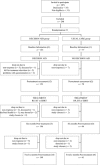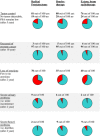Does a decision aid for prostate cancer affect different aspects of decisional regret, assessed with new regret scales? A randomized, controlled trial
- PMID: 25940277
- PMCID: PMC5055275
- DOI: 10.1111/hex.12369
Does a decision aid for prostate cancer affect different aspects of decisional regret, assessed with new regret scales? A randomized, controlled trial
Abstract
Objective: To develop and validate new regret scales and examine whether a decision aid affects different aspects of regret in the treatment choice for prostate cancer.
Methods: This was a multicentre trial (three sites) with imbalanced randomization (1 : 2). From 2008 to 2011, patients with localized prostate cancer were randomized 1 : 2 to usual care (N = 77) or usual care plus a decision aid presenting risks and benefits of different treatments (N = 163). The treatments were surgery and (external or interstitial) radiotherapy. Regret was assessed before, and 6 and 12 months after treatment, using the Decisional regret scale by Brehaut et al. (Medical Decision Making, 23, 2003, 281), and three new scales focusing on process, option and outcome regret. The relation between decision aid and regret was analysed by anova.
Results: The concurrent validity of the new regret scales was confirmed by correlations between regret and anxiety, depression, decision evaluation scales and health-related quality of life. With a decision aid, patient participation was increased (P = 0.002), but regret was not. If anything, in patients with serious morbidity the decision aid resulted in a trend to less option regret and less Brehaut regret (P = 0.075 and P = 0.061, with effect sizes of 0.35 and 0.38, respectively). Exploratory analyses suggest that high-risk patients benefitted most from the decision aid.
Conclusion: The new regret scales may be of value in distinguishing separate aspects of regret. In general, regret was not affected by the decision aid. In patients with serious morbidity, a trend to lower option regret with a decision aid was observed.
Keywords: decision aid; patient participation; prostate cancer; regret.
© 2015 John Wiley & Sons Ltd.
Figures
References
-
- Shepherd HL, Butow PN, Tattersall MH. Factors which motivate cancer doctors to involve their patients in reaching treatment decisions. Patient Education and Counseling, 2011; 84: 229–235. - PubMed
-
- Legare F, Ratte S, Gravel K, Graham ID. Barriers and facilitators to implementing shared decision‐making in clinical practice: update of a systematic review of health professionals' perceptions. Patient Education and Counseling, 2008; 73: 526–535. - PubMed
-
- Mack JW, Smith TJ. Reasons why physicians do not have discussions about poor prognosis, why it matters, and what can be improved. Journal of Clinical Oncology, 2012; 30: 2715–2717. - PubMed
-
- Smith TJ, Dow LA, Virago E, Khatcheressian J, Lyckholm LJ, Matsuyama R. Giving honest information to patients with advanced cancer maintains hope. Oncology (Williston Park), 2010; 24: 521–525. - PubMed
Publication types
MeSH terms
LinkOut - more resources
Full Text Sources
Other Literature Sources
Medical



